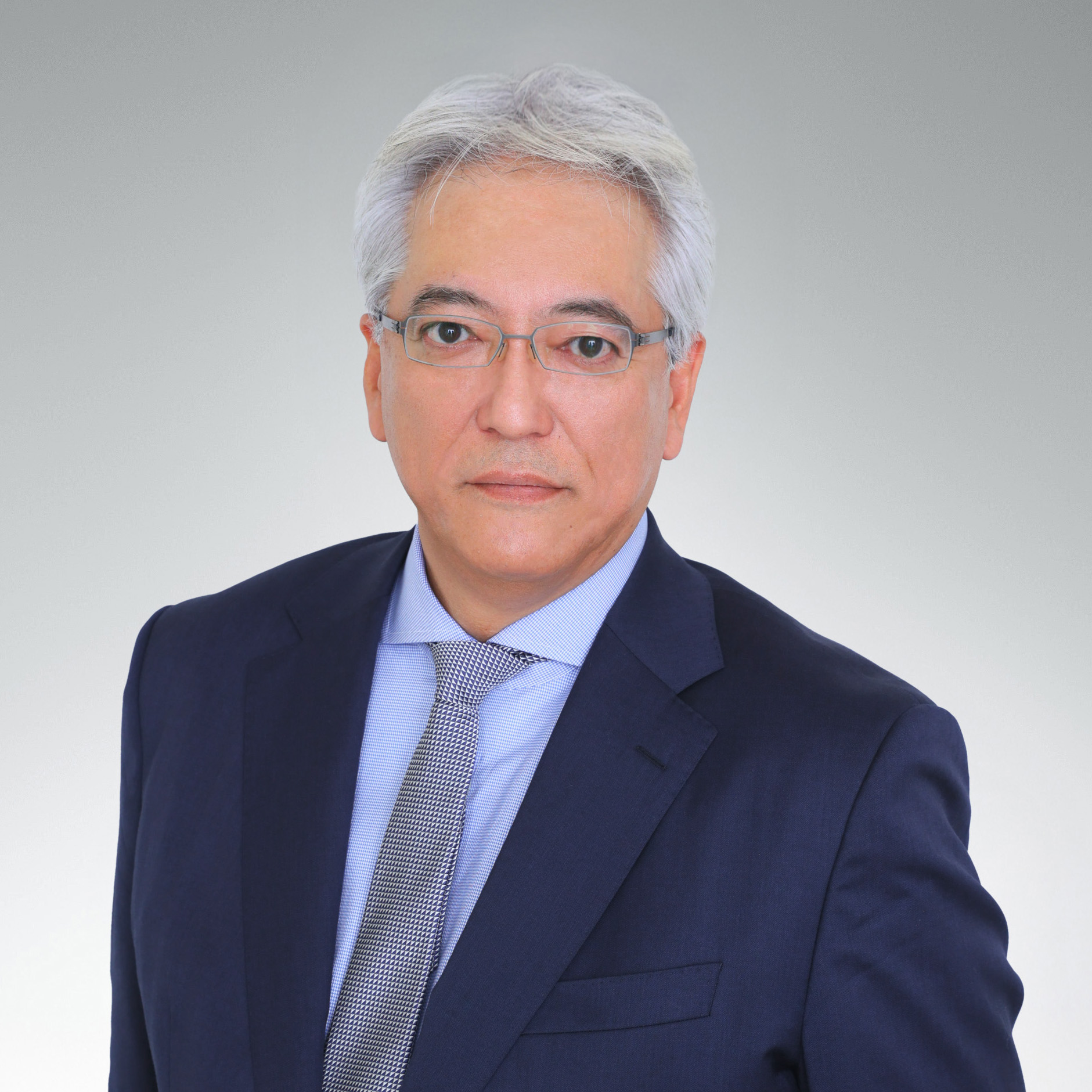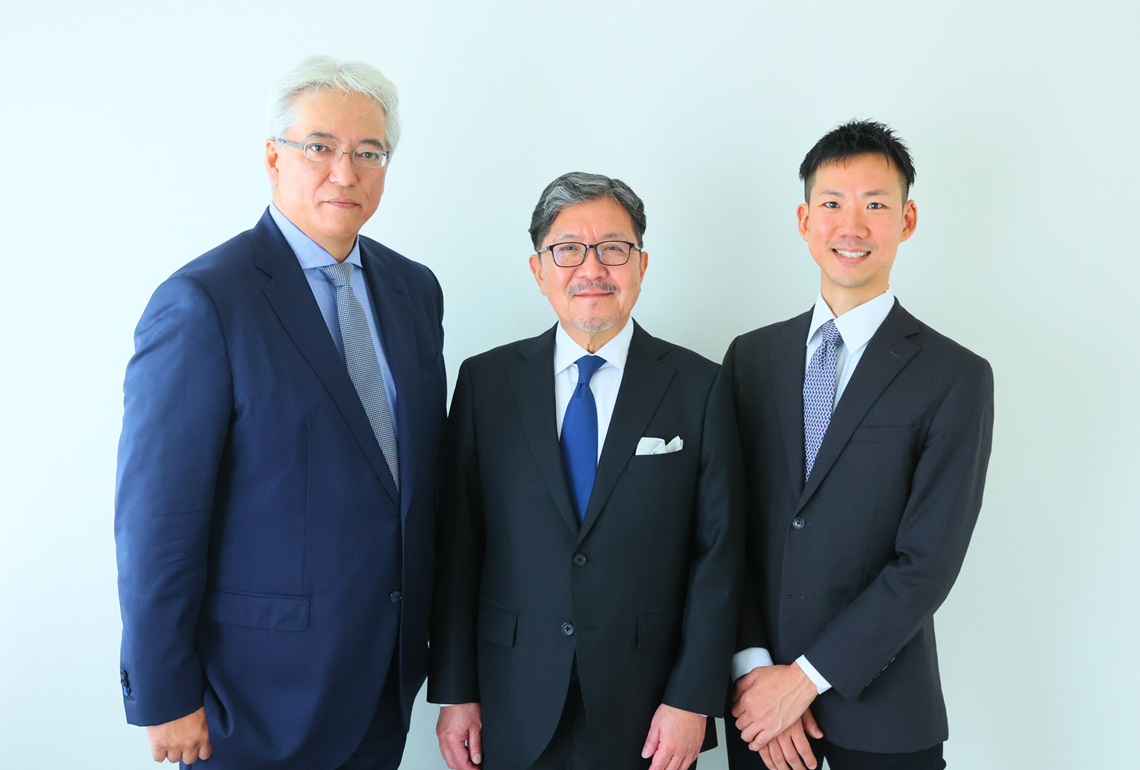2025.04.01
J-Pharma appoints Keiichi Masuya as Representative Director and Co-CEO, and transits to a new management structure
April 1, 2025
J-Pharma Co.,Ltd.
J-Pharma Co., Ltd. (Headquarters: Yokohama, Kanagawa, Japan; President: Masuhiro Yoshitake) announces that Keiichi Masuya, Ph.D., former Board Director and COO of PeptiDream Inc. has been appointed as Representative Director and Co-CEO after the Extraordinary Shareholders meeting and Board Meeting held on April 1, 2025, to strengthen the management and governance structure. With this appointment, J-Pharma will establish a two-person representative director structure with Masuhiro Yoshitake and Keiichi Masuya, and aim for further business growth based on a stronger management foundation.

Background and Appointment Purpose
Under the corporate philosophy of “contributing to people around the world to maintain good health and hope through the pursuit of new possibilities for SLC transporters and the development of innovative new drugs that address unmet medical needs” , with the leadership of Masuhiro Yoshitake, who was appointed President and Representative Director in 2018, J-Pharma has established the world’s leading position in the LAT1 drug discovery area and achieved dramatic growth in its business.
J-Pharma has successfully completed a Phase 2 clinical trial of nanvuranlat in Japan, received approval from the U.S. FDA for an Investigational New Drug (IND) application to begin clinical trials in cancer patients, and reached an outline agreement with the U.S. FDA on the design of a global Phase 3 clinical trial.1 J-Pharma will begin global Phase 3 clinical trials in the U.S. in 2025 with the aim of gaining approval in the U.S. by 2030.
J-Pharma will accelerate the development of JPH034 for multiple sclerosis, an autoimmune disease of the central nervous system, with the aim of completing the IND application for the clinical trial from the U.S. FDA and starting Phase 1 clinical trial in the U.S. by the end of fiscal year 2025.
Furthermore, under the lead of CFO Yutaka Fujimoto, J-Pharma succeeded in raising a total of maximum ¥5.77 billion yen in fiscal year 2024, establishing a solid financial foundation to accelerate our business.2
With the appointment of Keiichi Masuya, governance will be further strengthened under a two-person representative director structure, and under the strong leadership of Yoshitake, Masuya, and Fujimoto, we will accelerate global development, patent strategy, portfolio expansion, and commercialization. We aim to maximize the value of our business as the world’s leading biotech company developing LAT1 inhibitors.

Yutaka Fujimoto (CFO)
Notes
1 “IND Application Approved by U.S. FDA to Begin Clinical Trials for Cancer Patients” (J-Pharma News on October 1, 2024)
2 “J-Pharma Raises Maximum ¥5.77 Billion in Funding – Accelerates Global Development of LAT1 Inhibitors” (J-Pharma News on April 1, 2025)
Keiichi Masuya, Ph.D. Profile
Keiichi Masuya, Ph.D. served as Head of PPI Drug Discovery and Novartis Leading Scientist at Novartis International AG (Switzerland). From 2014 to 2024, he served as Board Director and COO of PeptiDream Inc., a biotech company listed on the TSE Prime Market, where he mainly led the company’s research and development efforts and drove a 40-fold increase in revenue and a 7-fold increase in headcount over a 10-year period.
Comments from Keiichi Masuya, Representative Director and Co-CEO of J-Pharma
J-Pharma has already established a unique position as a biotech venture originating from Japan, with tremendous potential yet to be unlocked. To accelerate the development of LAT1 inhibitors and explore new business opportunities leveraging our proprietary technologies, we recognize that there are some challenges we must overcome to significantly enhance our corporate value.
Joining J-Pharma at this pivotal stage, I am committed not only to advancing our ongoing R&D with greater speed and depth but also to launching new strategic initiatives and fostering active collaborations with external partners. I aim to drive J-Pharma evolving into a truly global and robust biotech company—one that can compete alongside leading firms in the US, Europe, and China.
New Board of Directors (as of April 1, 2025)
| Position | Name |
| Representative Director & President/ CEO | Masuhiro Yoshitake |
| Representative Director(Co-CEO) | Kenichi Masuya |
| Director & Chief Financial Officer(CFO) | Yutaka Fujimoto |
| External Director | Sadashi Suzuki |
| External Director | Shinichiro Komoto |
| External Director | Reiri Miura |
| External Director | Kazunobu Nishimura |
| External Director | Takuma Tsuzuku |
| External Director, Audit & Supervisory Committee | Toshiyuki Mori |
| External Director, Audit & Supervisory Committee | Teruhisa Tajima |
| External Director, Audit & Supervisory Committee | Kosaku Kawaguchi |
Reference Information
About J-Pharma Co., Ltd.
J-Pharma Co., Ltd. aims to “pursue new possibilities for SLC transporters and contribute to the health and hope of people worldwide through the development of innovative new drugs that address unmet medical needs.” Under this mission, the Company has focused on LAT1 (L-type amino acid transporter 1), one of the SLC transporters discovered by the Company’s founder, and is advancing the development of LAT1 inhibitors to address the needs of patients with cancer and autoimmune diseases, where existing drugs are insufficient. Currently, J-Pharma is conducting clinical development for LAT1 inhibitors such as “nanvuranlat” and “JPH034,” and is also advancing research on new candidate compounds. In October 2023, the Company established a U.S. subsidiary and is closely collaborating with involved organizations and U.S. consultants to develop appropriate regulatory, development, and intellectual property strategies.
For more information about J-Pharma, please visit https://www.j-pharma.com/en/.
About nanvuranlat
Nanvuranlat is a novel small-molecule compound independently discovered by J-Pharma that selectively inhibits LAT1. Since 2015, J-Pharma has conducted Phase 1 clinical trial targeting multiple solid tumors and identified its potential in treating bile duct cancer. From 2018, the Company carried out a Japan based Phase 2 trial over three and a half years, targeting advanced biliary tract cancer, and demonstrated significant clinical efficacy as a monotherapy. Nanvuranlat is the first compound in the world targeting LAT1 in clinical development, and if approved as a pharmaceutical product, it will be a first-in-class drug, offering a groundbreaking mechanism of action for the disease. Nanvuranlat was designated as an Orphan Drug by the U.S. Food and Drug Administration (FDA) in April 2022. This designation grants several benefits, including consultation for clinical development programs, tax credits for clinical trial costs, exemption from application fees, and seven years of market exclusivity in the United States. On September 25, 2024, the FDA approved the Investigational New Drug (IND) application for nanvuranlat for cancer patients.
*Publication on the results of the nanvuranlatPhase 2 study in Japan Furuse et al. A Phase 2 Placebo-Controlled Study of the Effect and Safety of nanvuranlat in Patients with Advanced Biliary Tract Cancers Previously Clin Cancer Res. 2024; 30(18):3990-3995.
About JPH034
JPH034 is being developed for the treatment of multiple sclerosis, an autoimmune disease of the central nervous system, and was selected for a Fast Forward Research and Commercialization Grant in June 2023 from the National Multiple Sclerosis Society (NMSS), which is known for its strict and competitive evaluation.
The Company and Georgetown University have been collaborating since 2019 to analyze the pharmaceutical efficacy of LAT1 inhibitors using mouse models of multiple sclerosis. Study results show that JPH034 modulates local inflammation of the central nervous system in demyelinating lesions, suggesting that JPH034 may be an effective drug for treatment of multiple sclerosis.
In particular, there is currently no drug that modulates microglia activity, which are known to cause continuous and irreversible disease progression in secondary progressive multiple sclerosis, a disease that progresses in most patients with relapsing-remitting multiple sclerosis and is expected to be an agent that can meet the unmet medical needs of many patients.
In June of 2024, J-Pharma entered into an agreement under which Georgetown University granted an exclusive worldwide license to utilize patents and patent applications for the use of amino acid transporter inhibitors for the treatment of inflammatory diseases of the central nervous system (including multiple sclerosis). This, in combination with the exclusive license for the JPH034 substance patent that the Company already holds, has resulted in a longer and stronger exclusivity period.
A clinical study without drug intervention is underway at an European university to test whether microglial activation, one of the inflammatory factors in the central nervous system, and LAT1 expression coexist at the level of demyelinating foci. Preparations are also underway to initiate a Phase 1 clinical trial overseas.
We will do our utmost to meet the expectations of our shareholders, patients who have high expectations for our drugs, and medical professionals as we push forward with the challenge of drug discovery. To this end, the Company will achieve financing and partnering to achieve our development plans with an appropriate balance of risk and return.
About Amino Acid Transporters
Many cells take in various substances to maintain their activity as nutrients. Amino acids and sugars are particularly important. Amino acid transporters play a role in transporting amino acids into the cells.
About LAT1
LAT1 (L-type amino acid transporter 1; gene code: SLC7A5) was discovered by Dr. Hitoshi Endou, the founder of J-Pharma, in 1998, making it the world’s first discovery. LAT1 is upregulated in the cell membrane when a cell becomes cancerous and attempts to proliferate rapidly. This results in the excessive uptake of amino acids, which serve as an energy source, leading to explosive cell growth1. Recent scientific advances have provided a more detailed understanding of LAT1, and its complex molecular structure has been reported, making it an increasingly important drug target in cancer therapy2. Studies have shown that cancer patients with high LAT1 expression tend to have poorer prognosis compared to those with low LAT1 expression3.
1. Häfliger P, et al. Int. J. Mol. Sci. 2019; 20 (10): 2428
2. Kanai Y. Pharmacol Ther. 2022; 230:107964
3. Otani R, et al. Cancers (Basel) 2023; 15: 1383
Inquiries:
J-Pharma Co., Ltd.
Administration Department Public Relations
TEL : +81-45-506-1155
https://www.j-pharma.com/en/contact

